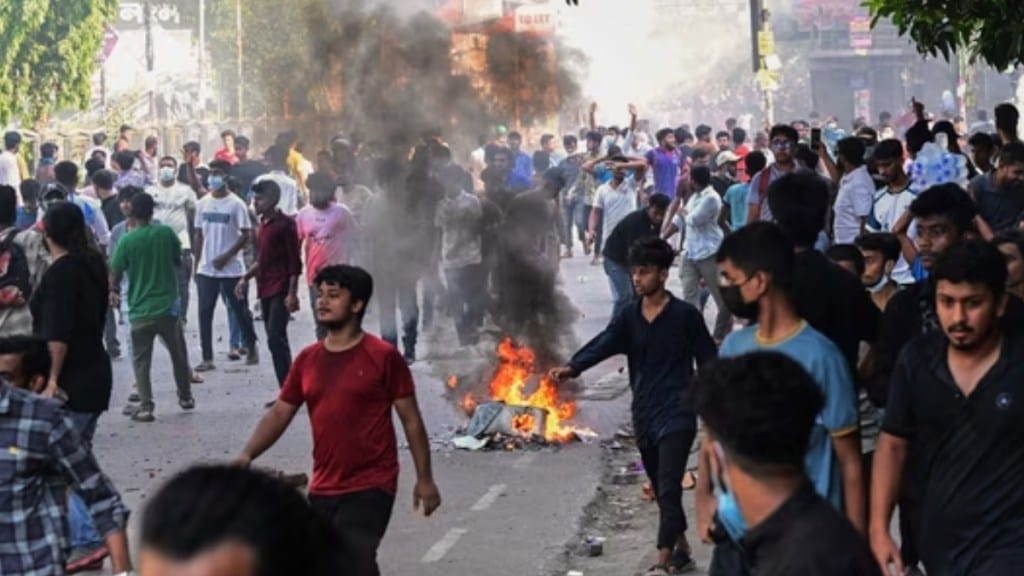Due to increasing civil unrest from student protests, soldiers are now patrolling the streets of Bangladesh. The police have been ordered to ‘shoot on sight’ anyone who breaks the curfew, indicating a strict response to the dissent.
The violence this week has claimed at least 133 lives, presenting a significant challenge to Prime Minister Sheikh Hasina’s government, now in its 15th year. Prime Minister Hasina, who had planned a diplomatic tour, canceled her departure due to the intensifying protests.
As the death toll rises and police struggle to control the protests, the Bangladeshi government imposed a national curfew and deployed the military on Friday. Although the curfew was temporarily lifted on Saturday afternoon for essential errands, the public is otherwise mandated to stay indoors, with all gatherings and demonstrations banned.
Bangladesh Protest: Internet shutdown
In addition to the curfew, a nationwide internet shutdown was implemented on Thursday, severely disrupting communication within and outside the country. Government websites remain offline, and major newspapers like the Dhaka Tribune and Daily Star have been unable to update their social media platforms.
The unrest has also affected nearly 1,000 Indian students, who have returned to India through various transit points or by flight. External Affairs Minister S. Jaishankar assured that the Foreign Ministry is fully focused on ensuring the safety and well-being of Indians in Bangladesh.
BSF helps in safe evacuation of Indian students amid student protests in Bangladesh, BSF officers on high alert at ICP Petrapole and all LCS.
In view of the ongoing student protests in Bangladesh, which are witnessing increasing violence and arson, the government has completely shut down the internet to control the situation. Amid this unrest, many Indian, Nepalese and Bhutanese students studying in various educational institutions in Bangladesh are being sent back to their country. The Border Security Force (BSF) South Bengal Frontier has set up special help desks at ICP Petrapole, LCS Gede, Ghojadanga and Mahadipur to facilitate the safe return of these students. So far, the BSF has successfully assisted in the return of 572 Indian students, 133 Nepalese students and 04 Bhutanese students.
BSF in constant touch with BGB: A.K Arya, DIG
BSF South Bengal Frontier’s spokesperson Shri A.K. Arya, DIG has confirmed that the BSF is in constant touch with Border Guard Bangladesh (BGB). This coordination has ensured safe evacuation of students even during night time operations. To further enhance the efficiency of the process, the immigration desk at ICP Petrapole will now be open 24/7, ensuring uninterrupted and safe passage for all students returning home.
In response to the crisis, the BSF and BGB have maintained a strong and collaborative approach to effectively manage the evacuation. Senior BSF officers at all LCS and ICP Petrapole locations are on high alert, ensuring that each student receives the necessary help and support. The safety and well-being of the students is of utmost priority, and additional facilities have been arranged to meet their needs.
BSF sets up special assistance counters at ICPs and LCSs
Medical assistance desks have been set up to address any health concerns of the returning students and special desks to help them rectify any required documentation. These are part of the comprehensive assistance system in place.
Arya, DIG emphasized that the BSF, in coordination with the BGB, is leaving no stone unturned to ensure the safe return of each student. The relentless efforts of the BSF and their high-alert status have contributed significantly to the smooth and efficient evacuation process. The dedicated and organized response of the BSF in this crisis underlines their commitment towards the safety of Indian nationals abroad. The assistance provided to the Nepalese and Bhutanese students also highlights the collaborative efforts and solidarity between the neighboring countries in times of need.


